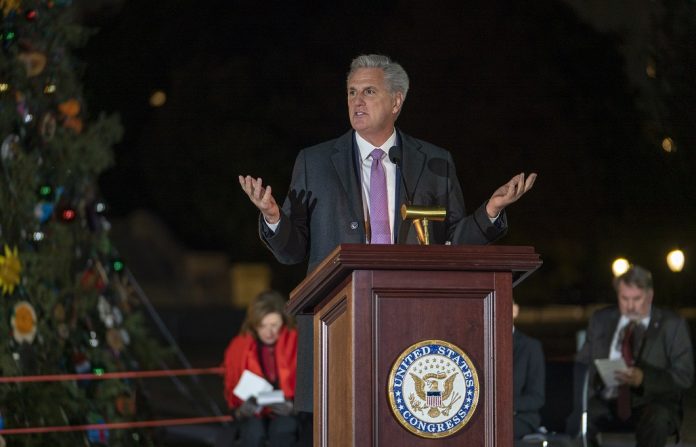Lenny Shail, Socialist Party Executive Committee
It seems that few weeks go by without a new stage of widening social polarisation and fracturing divisions developing within US society and US capitalism.
On 3 October, the Speaker of the House of Representatives, Republican Kevin McCarthy, was removed after a motion was moved by a member of his own party! The first time this has happened in US history.
Days before, McCarthy had outraged the extreme right and Trump-supporting wings of the Republicans after he had secured a temporary, last-minute deal with the Democrats and President Joe Biden for a funding bill to stop a government shutdown. Many of their red-line issues, such as spending cuts, were dropped and uncertainty over further funding for Ukraine continues.
Negotiations over the deals had been pushed to the final few hours in the same fashion as McCarthy’s election as Speaker of the House in the first place. In January 2023, the first ballot did not elect a speaker for the first time in 100 years. This was despite a Republican majority. In June 2023 the government also came within days of a default after hitting its debt ceiling.
And the can has only been kicked down the road yet again, with a government shutdown posed when the new deadline ends on the 17 November, such is the division that exists.
For working-class people across the US, the spectacle reflects the farce of two sides of US capitalism arguing over how much suffering and pain to pass onto ordinary people, using an outdated, chaotic, undemocratic system that in no way reflects or represents the needs of the masses.
Its why socialists fight for socialist change and the reorganisation of society, alongside the nationalisation of key industries and sections of the economy under democratic workers’ control and management, so the needs of ordinary working-class people are met.
For US capitalism, the impasse is just another fracture that is fuelling potential economic and social crisis. A recent Financial Times editorial summarised the situation: “The stakes for the US and the world are very high. The continued operation of the federal government – and Ukraine’s ability to sustain its fight against Russia’s invasion – may depend on getting Congress to agree to a budget that lasts more than a few weeks. If that is to happen, the House of Representatives needs a speaker.
“The chaos in Congress is part of a broader disintegration of the American political system. Donald Trump remains the favourite for the Republican Party nomination, despite facing four separate criminal cases and the possible loss of large parts of his business empire in a civil fraud case. With Trump as one of the two main candidates, the US presidential election will be chaotic. A leaderless Congress that cannot pass a budget would deepen the dark hole into which the US political system is descending.”
Extreme social polarisation continues to spread like fire across the country. On the economic front, the volatility of the situation and the threat of a shutdown still to come, has added further fuel to the US debt crisis that has pushed the cost of US government debt to levels not seen since 2007, that has had knock-on effects across the world. This further diminishes the strength and confidence of the US to dominate economically and militarily internationally.
But the biggest fear for the US ruling class is the reaction of the US working class against a government shutdown. The last time that the government shut down, during the Trump presidency, the question of a general strike was brought to national attention and became a factor in the situation, mainly from the call by flight attendant union leader Sara Nelson.
This time it takes place against the backdrop of an historic car workers’ strike by the left-led UAW union that has inspired millions across the country, a health workers’ strike currently taking place involving 75,000 workers at health consortium Kaiser Permanente, and rising workers’ militancy taking place across construction sites in the new ‘battery belt’ areas of the south. The contagion of struggle has begun to show the first signs of spreading. The potential for coordinated action and even the call for a general strike could easily become part of the equation once again.







